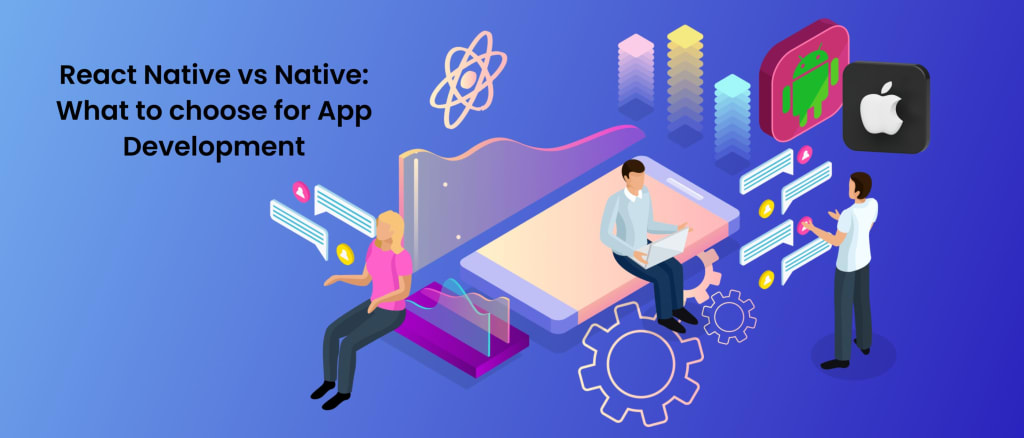React Native vs Native: What to choose for App Development
React Native vs Native

Since having a presence on Android and iOS platforms became necessary, the conflict between React Native and Native has developed. React Native offers numerous opportunities across platforms, thus although some users choose to stick with developing native applications, others switched to it.
This article will be helpful for you to read if you are having trouble deciding between two, one is native, and another is reacting native. In this section, we'll talk about which strategy to use to obtain the best return on your app development investment.
The React Native framework has expanded over the past 4 years to include a community of over 2,000 contributors and receives more than 300,000 downloads per week on average via npm. React Native has been adopted by some of the biggest businesses in the world, including Facebook, Pinterest, Skype, Uber, and Brex. The convenience of its cross-platform nature and the distinctive technology strategy employed to achieve this are the main factors driving its widespread acceptance.
Comparing Native Apps and React Native
React Native is a "hybrid" framework, which means it is platform-independent and is mostly written in JavaScript. Due to this, it differs from conventional apps created in native languages like Swift or Objective-C for Apple and Java or Kotlin for Android. As opposed to this, hybrid apps use a single codebase to create an app that can be used on both iOS and Android devices. This has the apparent advantage of requiring less code and associated logistics than creating two native apps in separate languages. Hybrids have the disadvantages of not being as performant as their native counterparts and occasionally not being able to utilize a device's resources fully.
Uniquely react to Native approaches issues. Instead of using WebViews, it uses a framework that enables it to render native components from the JavaScript code that serves as its foundation. Contrary to popular belief, React Native does not translate JavaScript into one of its native languages, such as Swift or Java. To further understand, let's examine the underlying structure of an equivalent native iOS and React Native "Hello World" app with a labelled button:
React Native vs Native Considerations for Selecting the Best Method for Developing Mobile Apps
Let's consider some important factors when deciding between Native and React Native mobile app development.
1. Development Time
When contrasting Native to React Native, it's important to remember that the former calls for distinct development for the Android and iOS platforms due to those systems' technical variances. You must set up two distinct teams—the iOS App development team and the Android App development team—in order to make your app available on both platforms. Additionally, the entire project must be constructed and run each time a modification is made to the code. This suggests that creating a mobile app requires more time and effort.
As the same developers developed it for both platforms, React Native, on the other hand, enables you to create apps for both iOS and Android using the same code. The concept of "hot reloading" also makes it easier to distribute the project without rebuilding it each time, which cuts down on the time and labour required to create React Native applications.
So pick React Native if you want to target both platforms while entering the mobile market more quickly and economically.
2. UI/UX Experience
Another aspect that determines whether React Native or Native is preferable is the UI/UX experience.
React Native app development provides challenges when developing complex user interfaces with features like custom views, navigation patterns, seamless transitions, and animations, yet allowing developers to reuse functionality and create platform-specific code separately. It cannot be easy to compare the UI/UX standards of the Android and iOS platforms. However, this is not the case while developing a native app.
Because each screen is built individually for Android and iOS devices, native application development offers a better mobile app UI/UX experience.
Therefore, the latter approach to React Native vs Native app creation offers the best overall mobile app experience.
3. Performance
The app's performance should be considered while contrasting native and react native development.
React Native uses JavaScript, which employs a single dedicated device thread. It cannot manage multiple asynchronous jobs at once. The framework also doesn't support a lot of current modules and functionality. As a result, using advanced technologies, native device features, and carrying out complex tasks are incompatible.
On the other hand, creating native apps in Swift, Java, or Kotlin is far more advantageous than doing it in JavaScript when working on sophisticated computations, integrating cutting-edge hardware, and implementing advanced features. Mobile app developers may now easily create any application using Native technology.
In short, Native performs better for apps than React Native.
4. Cost of mobile apps
Your decision on the best technology will be influenced by the answer to the question of how much it costs to design a mobile app. According to the top mobile application development company, employing React Native instead of Native development can reduce expenditures for the same app project by 30% to 35%.
Therefore, if cost is your main criterion, React Native is your ideal option.
5. Scalability
Compared to Native technology, React Native gives mobile app developers more options for handling more work in an application and releasing updates with higher functionalities. As a result, React Native offers greater scalability than native app development.
6. Programming Language
The native programming languages for Android and iOS, Kotlin, Java, and Swift, are thought of as strict-typed and OOPs-oriented languages. Even if it takes some time to become acquainted with them, if you have the appropriate documentation and a set of guidelines, they are simple to comprehend.
Contrarily, JavaScript appears to be simpler to learn but has several errors, weak documentation, and other issues that make it difficult for developers of React Native apps to understand the language fully.
Therefore, once more, native prevails over react native in this comparison.
7. The Long-Term App's Scope
The long-term scope is a further factor to consider when deciding between Native and React Native for app development.
Native platforms can easily access the tools required to develop new functionality, resolve bugs, and release updates without affecting the app's usability because Google and Apple support them.
On the other hand, React Native does not give updates priority. The tools and releases must be updated in the future because they do not align with those of Apple and Google. Furthermore, there is less certainty regarding how long the support will last, again raising the question of whether or not one should choose React Native for a long-term app process.
8. Native App Interactivity
The interaction with native apps is a key factor in determining how to react native and native approaches differ from each other.
A native mobile application may easily interact with other native apps and access their data to deliver a better user experience. However, adopting React Native makes it impossible to achieve this.
Because they rely on third-party libraries to communicate with other native apps, React Native apps have less access to data than native apps do. React Native for mobile app development becomes a secondary option when your software must regularly interface with other native mobile apps.
9. API and Third Party Libraries Support
The Native Mobile application development agency frameworks can use all different kinds of APIs directly regarding API accessibility. The same, however, is not feasible while using React Native technology.
Only a few APIs can be used by react native app development company. You must create a communication layer using Native technologies to develop sophisticated APIs. This proves that when you need to implement a variety of APIs, Native is better than React Native.
10. Support for Native Modules
React Native easily handles a wide variety of cross-platform use cases, but it lacks the APIs necessary to implement complete native mobile capabilities. React Native relies on the idea of adding native module support to access those inaccessible APIs, which necessitates that the React native app development services you choose are proficient in both native programming languages.
However, there are no limitations when developing a native mobile app for an Android or iOS device, demonstrating why native app development is preferable to react Native.
11. App Security
Compared to Native app development languages like Java, Kotlin (for Android), Objective-C, and Swift, JavaScript, the language used by the React Native framework, is not extensively typed or based on OOPs (Object Oriented Programming) (for iOS). Furthermore, React Native uses various third-party libraries and APIs, making it difficult to find errors and faults during the development process. Because of this, React Native is less secure than Native app development methods.
12. Application Upkeep
The concept of app maintenance is difficult and time-consuming for Native app development. This is because each defect on the Native platform must be handled independently and with attention.
Building mobile apps with React Native is sufficient to address bugs on a single platform unless native app support is a problem.
Even though we have already covered the many decision-making factors, let's go over all the specifications right now to aid you in selecting the greatest technology for your next app project.
Conclusion
React Native is a remarkable tool for creating apps by the best Mobile App Development Company, to put it briefly. It might be the ideal option for enthusiasts looking for a multi-platform programme without a lot of complexity. A web development team or a limited budget are also appropriate circumstances to use the framework for your project. React Native won't require you to cultivate a liking for it because it immediately wins you with its capacity to speed up app development by reusing code for several operating systems without compromising user experience.
FAQ’s
What is React Native?
A framework called React Native was created and promoted by Facebook. It uses the well-known web library React and applies all of its features to mobile programming.
Is native superior to responding Native?
React native apps are preferable to native apps when you don't know your target market, have a tight budget, can't put in as much effort, or are unsure of which platform to launch your app on.
Are native apps faster than react Native?
It does not operate more slowly than native programmes.
Is react native hybrid or Native?
React Native is hybrid technology. It is a cross-platform framework alternative. That suggests that it creates apps for both the Android and iOS platforms.
About the Creator
Pairroxz Technologies
Pairroxz Mobile App Development Company was founded in 2011 with the aim of providing the best e-solutions to people (clients) and simplifying their goals through app development.






Comments
There are no comments for this story
Be the first to respond and start the conversation.